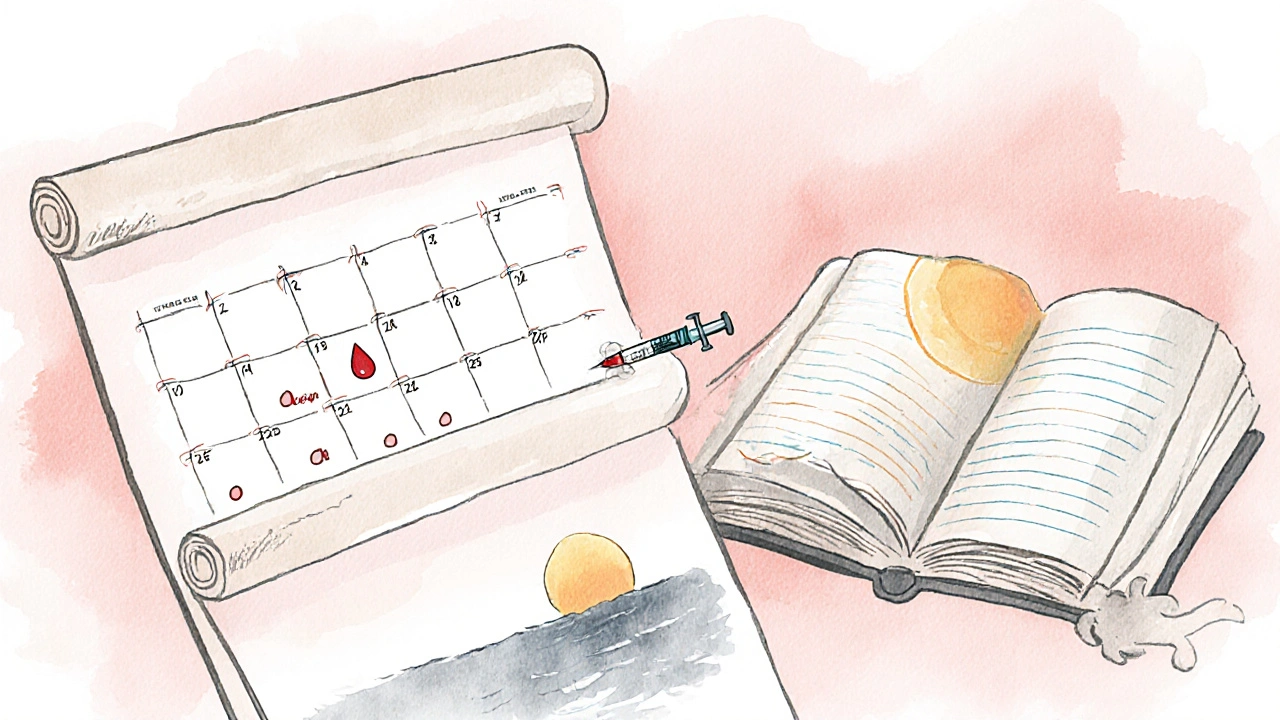
When you're prescribed azathioprine, it’s not just about taking a pill. It’s about understanding how much to take, when to take it, and what your body might do in response. This drug doesn’t play nice with guesswork. Too little, and it won’t work. Too much, and you risk serious harm. There’s no one-size-fits-all dose - your doctor will tailor it to your weight, condition, and how your liver handles it.
How Azathioprine Works
Azathioprine is an immunosuppressant. That means it slows down your immune system. For people with autoimmune diseases like Crohn’s, ulcerative colitis, rheumatoid arthritis, or lupus, the immune system attacks the body by mistake. Azathioprine steps in to calm that overreaction. It’s also used after organ transplants to prevent rejection. It doesn’t cure these conditions - it keeps them under control. And it takes time. Most people don’t feel better for 6 to 12 weeks after starting.
Starting Dose: What’s Typical?
Most adults begin with 1 to 1.5 milligrams per kilogram of body weight per day. That’s usually between 50 and 100 mg daily. For example, if you weigh 70 kg (about 154 lbs), your starting dose might be 70 mg. It’s often split into two smaller doses - one in the morning, one at night - to help reduce stomach upset. Some doctors start lower, especially if you’re older or have liver issues. Never change your dose without talking to your doctor.
How Your Body Processes Azathioprine
Your liver breaks down azathioprine using an enzyme called TPMT. About 1 in 300 people have a genetic variation that makes this enzyme work very slowly. If you’re one of them, even a normal dose can build up to toxic levels and damage your bone marrow. That’s why many doctors test your TPMT levels before prescribing azathioprine. If your enzyme activity is low, your dose will be cut by 70-90%. Some people can’t take it at all. This isn’t optional - it’s life-saving.
Monitoring: Blood Tests Are Non-Negotiable
You’ll need regular blood tests, especially in the first few months. Doctors check your complete blood count (CBC) every 1-2 weeks at first, then monthly once you’re stable. Why? Azathioprine can lower white blood cells, red blood cells, and platelets. If your counts drop too far, you’re at risk for infections, anemia, or bleeding. Liver function tests are also done monthly. Elevated liver enzymes mean your liver is under stress. If levels keep climbing, your dose may need to be lowered or stopped.
What Happens If You Miss a Dose?
If you forget a dose, take it as soon as you remember - unless it’s almost time for the next one. Never double up. Missing one dose won’t ruin your treatment, but skipping regularly makes the drug less effective. If you miss more than two days in a row, call your doctor. Don’t just restart on your own. Your body might have adjusted, and jumping back in could cause side effects.

Side Effects: What to Watch For
Not everyone has them, but they’re common enough to know. Nausea and vomiting happen in up to 30% of people, especially early on. Taking the pill with food or at bedtime helps. Diarrhea, loss of appetite, and fatigue are also frequent. More serious signs include unexplained bruising, fever, sore throat, or yellowing skin - these could mean your bone marrow or liver is being affected. Call your doctor immediately if you notice any of these. Long-term use slightly increases the risk of skin cancer and lymphoma. Use sunscreen, avoid tanning beds, and get regular skin checks.
Drug Interactions: Don’t Mix Carelessly
Azathioprine doesn’t mix well with some common drugs. Allopurinol (used for gout) can cause dangerous buildup of azathioprine - if you’re on both, your azathioprine dose must be cut to 25% of normal. Certain antibiotics like trimethoprim-sulfamethoxazole can also raise your risk of low blood counts. Even over-the-counter painkillers like NSAIDs (ibuprofen, naproxen) can irritate your gut more when combined with azathioprine. Always tell your pharmacist and doctor about every supplement, herb, or OTC med you take.
Special Cases: Pregnancy, Kids, and Older Adults
Pregnant women can take azathioprine if needed - it’s one of the safer immunosuppressants during pregnancy. Studies show no major increase in birth defects, but your doctor will monitor you closely. For children, dosing is based on weight and often starts lower. Older adults (over 65) may need reduced doses because their livers and kidneys process drugs slower. They’re also more likely to have other health issues that interact with azathioprine.
How Long Do You Stay on It?
Many people stay on azathioprine for years - sometimes for life. In autoimmune diseases, stopping too soon can trigger a flare-up. In transplant patients, it’s usually lifelong. But if you’ve been in remission for over two years and your disease is stable, your doctor might consider slowly tapering off. Never stop on your own. Stopping suddenly can cause your immune system to rebound hard, making symptoms worse than before.

When Azathioprine Isn’t Right for You
If you’ve had severe allergic reactions to it, or if you have active infections like tuberculosis or hepatitis B, you shouldn’t start it. People with a history of certain cancers (especially lymphoma) need careful evaluation. If your TPMT test shows very low activity, your doctor will likely choose a different drug. Alternatives include mycophenolate, methotrexate, or biologics like infliximab - each with their own pros and cons.
Real-Life Example: A Patient’s Journey
At 32, Sarah was diagnosed with ulcerative colitis. She started on 75 mg of azathioprine daily. After two weeks, she had nausea and her white blood cell count dropped slightly. Her doctor lowered the dose to 50 mg and added an anti-nausea pill. Four weeks later, her blood counts stabilized. At 12 weeks, her symptoms improved significantly. She’s been on the same dose for three years now, with monthly blood tests. She takes her pill with dinner and keeps a journal of how she feels. That’s how she caught a mild cold early - and avoided a hospital visit.
Key Takeaways
- Your azathioprine dose is personal - based on weight, genetics, and health history.
- TPMT testing before starting is critical to avoid life-threatening toxicity.
- Regular blood tests every 1-4 weeks are mandatory in the first months.
- Never adjust your dose without medical advice - even if you feel fine.
- Side effects like nausea are common, but fever, bruising, or yellow skin need immediate attention.
Frequently Asked Questions
Can I drink alcohol while taking azathioprine?
It’s best to avoid alcohol. Both alcohol and azathioprine stress your liver. Together, they increase the risk of liver damage. Even moderate drinking can raise liver enzyme levels faster. If you choose to drink, limit it to one drink occasionally and tell your doctor.
Does azathioprine cause weight gain?
Azathioprine itself doesn’t cause weight gain. But if you’re taking steroids like prednisone at the same time - which many people are - that’s likely the cause. Steroids increase appetite and fluid retention. Once you reduce steroids, weight often comes off. Track your diet and activity levels if you’re gaining weight.
How long does it take for azathioprine to leave your system?
The drug clears from your bloodstream in about 24 hours. But its effects on your immune system last much longer. That’s why you don’t feel side effects right away - and why stopping it doesn’t make symptoms disappear immediately. It can take weeks or months for your immune system to fully recover after stopping.
Is azathioprine better than methotrexate?
It depends on your condition and tolerance. Azathioprine is often preferred for inflammatory bowel disease. Methotrexate is more common for rheumatoid arthritis and psoriasis. Both require blood monitoring. Methotrexate can cause more nausea and hair thinning; azathioprine carries a slightly higher risk of liver issues. Your doctor picks based on your history and test results.
Can I get vaccinated while on azathioprine?
Yes - but only inactivated vaccines. Flu shots, pneumonia vaccines, and COVID boosters are safe. Avoid live vaccines like MMR, chickenpox, or nasal flu spray. They can cause infection when your immune system is suppressed. Always tell your doctor you’re on azathioprine before getting any vaccine.
Wow. Just… wow. This isn’t just medical advice-it’s a manifesto on human vulnerability. Azathioprine doesn’t just suppress the immune system; it forces you to confront the fragility of your own biology. Every blood test is a mirror. Every dosage adjustment, a negotiation with death. And yet-we take it. Not because we’re brave, but because we have no other choice. The body becomes a battlefield, and the pill, a truce written in chemistry. I’ve been on it for seven years. I don’t feel cured. I feel… carefully held together.
My sister started this after her Crohn’s flare last year. She cried the first time she got her TPMT results back. Not because it was bad-but because she finally understood why she’d been so sick for years. Doctors kept saying ‘it’s just stress.’ No. It was her liver screaming. This post? It’s the only thing that ever made her feel seen. Thank you.
It is deeply concerning that so many patients are permitted to self-manage such a potent immunosuppressant without rigorous oversight. In my professional capacity as a licensed clinical ethicist, I must emphasize that the casual tone of this post dangerously normalizes pharmaceutical noncompliance. The notion that one might 'take it with food' as if it were an aspirin is not merely irresponsible-it is ethically indefensible. Regulatory bodies must intervene before this becomes a public health crisis.
I’ve been on azathioprine since I was 19. Now I’m 42. I’ve watched friends die from flares. I’ve watched others get cancer from it. I’ve watched doctors forget to check CBCs because ‘you look fine.’ But here’s the truth nobody says: you don’t take this drug to feel better. You take it to not die. The nausea? The fatigue? The fear every time you get a cold? That’s the price of staying alive. And if you’re lucky? You’ll live long enough to hate the silence between your heartbeats more than the side effects.
Actually, the starting dose of 1–1.5 mg/kg is outdated. A 2021 meta-analysis in The Lancet Gastroenterology & Hepatology showed that 0.8–1.0 mg/kg yields comparable efficacy with significantly lower myelotoxicity rates. Furthermore, the TPMT testing protocol referenced here ignores the emerging role of NUDT15 polymorphisms in East Asian populations-which are now recognized as the primary determinant of toxicity in over 40% of patients of Asian descent. This post is dangerously incomplete.
People don’t realize how many of these patients are just lazy. They don’t want to do the blood tests. They don’t want to be told they can’t drink. They want a magic pill. But this isn’t a vitamin. It’s a chemical leash. And if you’re not willing to wear it properly? Then you shouldn’t be on it. Stop blaming the drug. Start taking responsibility.
They test TPMT… but what about the labs? Ever wonder who owns the labs? The same companies that make the drugs. They control the thresholds. They decide what’s ‘normal.’ And if your counts drop just below the line? They say ‘it’s fine.’ But your bone marrow is dying. They don’t tell you that. They don’t tell you about the hidden studies. This isn’t medicine. It’s a controlled experiment.
I’m a nurse and I see this every day. One of my patients, a 68-year-old veteran, started azathioprine after his transplant. He didn’t know how to read. Couldn’t afford the blood tests at first. We got him connected with free clinics. Now he comes in every month like clockwork. He says, ‘I’m not just taking a pill-I’m showing up for my life.’ That’s what this drug really is: a daily act of courage.
Why do they even prescribe this? I read somewhere that azathioprine was originally developed as a chemical weapon. It was meant to kill white blood cells. Now we give it to people who are already sick? The pharmaceutical industry is a cult. They profit from chronic illness. They want you dependent. They want you scared. And they use ‘TPMT testing’ as a smokescreen to make you feel safe. It’s all a scam.
It is a curious irony that the same individuals who decry ‘Big Pharma’ routinely place their entire physiological well-being in the hands of a compound derived from purine analogs-molecular structures that were synthesized in Cold War-era laboratories under military contract. The cognitive dissonance is not merely pronounced; it is ontologically incoherent. Furthermore, the casual invocation of ‘liver function’ as a proxy for systemic safety ignores the hepatocyte’s role in xenobiotic metabolism, which is modulated by CYP450 isoforms, not merely TPMT. The post, while well-intentioned, is epistemologically unsound.
I’ve been on azathioprine for 14 years. I used to think I was just surviving. Now I think I’m learning how to live inside my own body again. It’s not about being cured. It’s about learning to listen-to the quiet hum of your cells, to the way your skin feels when it’s not itching, to the weight of your breath when you don’t have to fight for it. I don’t take this pill because I’m told to. I take it because I’ve learned to love the quiet.
They say ‘it takes 6–12 weeks.’ But what if it takes 18? What if you’re 27 and you’ve been crying in the shower every night because you’re so tired, and your hair is falling out, and your mom says ‘just be patient’-but patience is the last thing you have left? I didn’t feel better until month 14. No one told me that. No one says that. They just hand you the script and walk away. And then you’re alone with your body… and your fear.
One must observe that the modern pharmacopeia has become a cathedral of misplaced faith. Azathioprine, though potent, is but a cog in the machine of industrialized healing. One wonders: why do we not question the very architecture of disease? Why do we accept that the immune system must be subdued, rather than restored? Perhaps the answer lies not in enzymes or dosages, but in the soil we walk upon, the water we drink, the silence we have forgotten how to keep.
okay so like i took this for like 2 months and i got so sick i thought i was gonna die?? like my white blood cells were so low i was scared to sneeze?? and my doc was like ‘eh, it’s normal’ and i was like ‘you’re not the one living in my body’ so i quit. now i’m on turmeric and vibes. my gut feels better. also i meditate. maybe the pill was just stress??
So let me get this straight. You’re telling me the only reason people stay on this drug is because they’re too afraid to die? Not because it works? Just because the alternative is worse? That’s not medicine. That’s a hostage situation with a prescription pad.